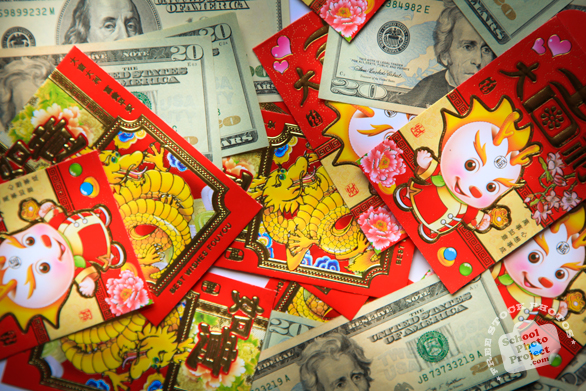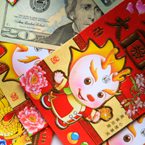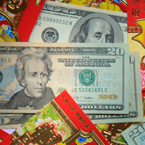Red
Envelope (Hong Bao)
In Chinese and other Asian societies,
a red envelope or red packet is a monetary gift
which is given during holidays or special occasions.
It is known as hóngbao in Mandarin, Ang Bao
in Taiwanese, Ang Pao in Min Nan, Lei See in Cantonese,
Sae Bae Don in Korean, and Lì Xì in
Vietnamese.
Red envelopes are mainly presented at social and
family gatherings such as weddings or on holidays
such as the Lunar New Year. The red color of the
envelope symbolizes good luck and is supposed to
ward off evil spirits.
The amount of money contained in the envelope usually
ends with an even digit, in accordance with Chinese
beliefs; for instance 88 and 168 are both lucky
numbers, as odd-numbered money gifts are traditionally
associated with funerals. There is also a widespread
tradition that money should not be given in fours,
or the number four should not appear in the amount,
such as in 40, 400 and 444, as the pronunciation
of the word "four" resembles that of the
word "death" and thus signifies bad luck
for many Chinese. At weddings, the amount offered
is usually intended to cover the cost of the attendees
as well as signify goodwill to the newlyweds.
During the Lunar New Year, mainly in Southern China,
red envelopes are typically given by the married
to the unmarried, most of whom are children. (In
the North, money is not given in envelopes.) The
amount of money is usually a single note to avoid
heavy coins and to make it difficult to judge the
amount inside before opening. It is traditional
to put brand new notes inside red envelopes and
also to avoid opening the envelopes in front of
the relatives out of courtesy.
In Vietnam, lì xì is lucky money and
are typically given to those who are children. Red
envelopes are also used to deliver payment for favorable
service to lion dance performers, religious practitioners,
teachers and doctors.
There are no clear literary sources from which to
trace the origin of the red envelope tradition.
In China, during the Qin Dynasty, the elderly would
thread coins with a red string. The money was called
yasuì qiánmeaning "money warding
off evil spirits", and was believed to protect
the elderly from sickness and death. The yasuì
qián was replaced by red envelopes when printing
presses became more common. Red envelopes are also
referred to as yasuì qián.
(Source: Wikipedia.org)
|
















